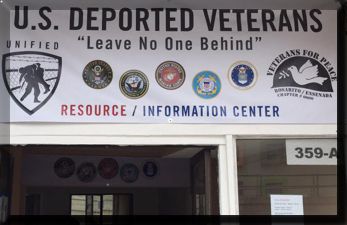
| From Draft NOtices, July-September 2017 Removing a Few “Bad Hombres”: Veterans and Deportation— Isidro Ortiz |

|
|||
In the last presidential debate in 2016, when candidate Donald Trump announced that his immigration policy would emphasize deportations, little attention was paid to the issue of how veterans might be affected. Few, if any, inquired whether veterans would be deported. The lack of attention and concern are partially due to the persistence of myths about the immigration issue and veterans. Moreover, since Trump had earlier suggested that the deportation would focus on getting rid of “bad hombres,” it was assumed that veterans would not be affected by President Trump’s immigration policy. After all, it’s hard to conceive of men and women who have served their country as “bad” people meriting deportation. Unfortunately, veterans have not been a class unaffected by the issue, and myths persist about veterans and immigration. Among the myths are the following: Myth #1: Immigrants, documented and undocumented, do not serve in the military.
Myth #2: The United States does not deport those who have served in the military.
Myth #3: Loyalty, respect and integrity have been the operative values in the U.S. government’s relationships with immigrants in the military.
Myth #4: If immigrant veterans are suffering it’s because, like other veterans, they have lacked initiative and are passive on issues that affect them, preferring to assume the role of victim.
On June 19 the chairwoman of the Congressional Hispanic Caucus (CHC) wrote a letter to David J. Shulkin, Secretary of the U.S. Department of Veterans Affairs. The representatives requested an “urgent meeting . . . to discuss how we can immediately stop the federal government from deporting United State veterans who were lawful permanent residents at the time of their deportation.” The letter was preceded two weeks earlier by a trip by members of the CHC to Tijuana, Mexico, to meet with several deported veterans. During the visit, the veterans shared many of the challenges they faced when they were initially deported and separated from their families. These actions occurred in the wake of the reintroduction in March of legislation that would establish a veteran visa program which would permit eligible deported veterans to permanently return to the United States as Lawful Permanent Residents eligible for naturalization. Titled the “Veterans Visa and Protection Act” (HR 1405), the bill was introduced by Congressman Raul M. Grijalva of Arizona. Another development was the much anticipated ruling by a federal immigration judge in the case of Miguel Perez, Jr., who enlisted in the Army in 2001. At the time, Perez was a legal permanent resident who, like other veterans, thought he became a U.S. citizen when he enlisted. On his second tour in Afghanistan he experienced a traumatic brain injury after his vehicle was hit by an IED and suffered from PTSD after his honorable discharge. While continuing to experience the consequences of his injury and inadequate health care, Perez was convicted in 2010 for a nonviolent drug offense. In September 2016, after serving a seven-year sentence, he was immediately handed over to ICE and subjected to deportation proceedings. Perez and his family waged an intense campaign against deportation; but in mid-March the deportation judge ordered that Perez be sent to Mexico, rejecting his request for relief under the United Nations Convention Against Torture. Perez currently remains in ICE custody. In the spring of 2015, deported veteran Hector Barajas, who directs the Deported Veterans Support House (aka ‘the Bunker’) in Tijuana, contacted the ACLU of California. He wished to explore whether the ACLU could provide legal and policy support on immigration relief for veterans seeking return to the U.S. and assistance obtaining medical benefits owed to the veterans by Veterans Affairs. Barajas subsequently brought to the ACLU’s attention the plight of deported veteran Jose Solorio, who was dying from pulmonary fibrosis. After the ACLU’s intervention Solorio received medical attention but died because his condition had deteriorated to the point that he could not undergo the needed lung transplant. In the aftermath of Solorio’s death, the ACLU initiated a study of the plight and experience of deported veterans and veterans fighting deportation. The study led to a ground-breaking report: “Discharged Then Discarded.” It presented the ACLU’s analysis of 59 cases of veterans who were already deported or were still in the U.S. confronting deportation like Perez. The report offered recommendations on the basis of its findings. As ACLU has noted, the report would not have occurred without the initiative of Barajas and the willingness of other veterans to bring their plight to national consciousness. For updates on related legislation, visit the Congressional Hispanic Caucus online or the web site of Rep. Raul M. Grijalva, https://grijalva.house.gov/ Information sources: American Civil Liberties Union of California, “Discharged then Discarded: How U.S. veterans are banished by the country they swore to protect.” November 2016. Office of the Chairman of the Joint Chiefs of Staff White Paper, “Veteran Stereotypes: A Closer Look,” October 2014. Sarah E. Minnis, “Divisive Narratives and Good Intentions,” June 2014, naspa.org. This article is from Draft NOtices, the newsletter of the Committee Opposed to Militarism and the Draft (http://www.comdsd.org/). |
||||